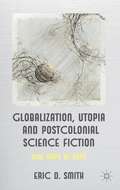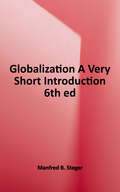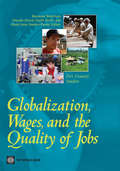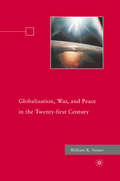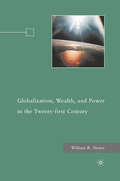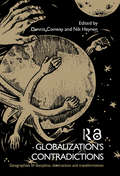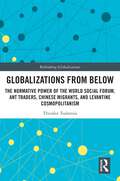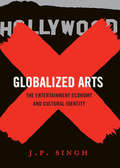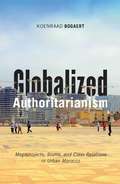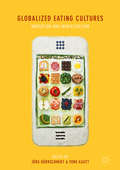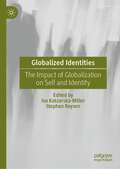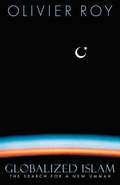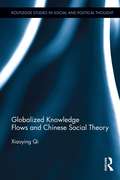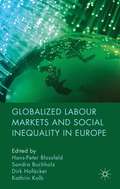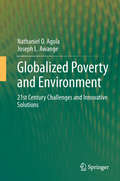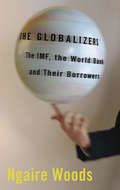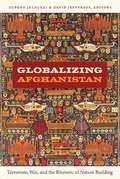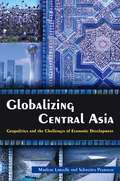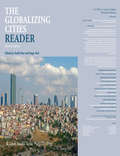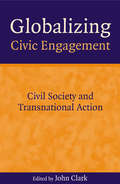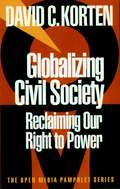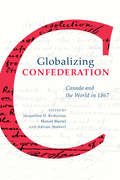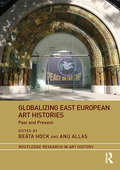- Table View
- List View
Globalization, Utopia, and Postcolonial Science Fiction
by Eric D. SmithThis study considers the recent surge of science fiction narratives from the postcolonial Third World as a utopian response to the spatial, political, and representational dilemmas that attend globalization.
Globalization: A Very Short Introduction (Very Short Introductions Ser.)
by Manfred B. StegerVery Short Introductions: Brilliant, Sharp, Inspiring We live today in an interconnected world in which ordinary people can become instant online celebrities to millions of fans thousands of miles away, in which religious leaders can influence billions globally, in which humans are altering the climate and environment, in which new infectious diseases spread across continents at lightning speed, and in which complex social forces are increasingly impacted by digital technology. This is globalization. In the sixth edition of his bestselling Very Short Introduction, Manfred B. Steger offers concise definitions of pertinent key terms and concepts. He provides an accessible overview of the long history of globalization followed by an examination of its major dimensions: economic, political, cultural, ideological, and ecological. He also engages the hotly contested question of whether it is, ultimately, a good or a bad thing. From climate change to the COVID-19 pandemic, resurgent nationalism to global social media, trade wars to China's growing global profile, Russia's expansionism to renewed fears of nuclear conflicts, he explores today's unprecedented levels of planetary integration and disruption. About The Series: The Very Short Introductions series from Oxford University Press contains hundreds of titles in almost every subject area. These pocket-sized books are the perfect way to get ahead in a new subject quickly. Our expert authors combine facts, analysis, perspective, new ideas, and enthusiasm to make interesting and challenging topics highly readable.
Globalization, Wages, and the Quality of Jobs
by Drusilla Brown Raymond Robertson Gaëlle Le Borgne Pierre Maria Laura Sanchez-PuertaSince the early 1990s, most developing economies have become more integrated with the world's economy. Trade and foreign investment barriers have been progressively lifted and international trade agreements signed. These reforms have led to important changes in the structures of these economies. The labor markets have adjusted to these major changes, and workers were required to adapt to them in one way or another. In 2006, the Social Protection Unit of the World Bank launched an important research program to understand the impact that these profound structural changes have had on workers in developing countries. 'Globalization, Wages, and the Quality of Jobs: Five Country Studies' presents the findings and insights of this important research program. In particular, the authors present the similar experiences of low-income countries with globalization and suggest that low-income countries' working conditions have improved in the sectors exposed to globalization. However, 'Globalization, Wages, and the Quality of Jobs' also highlights concerns about the sustainability of these improvements and that the positive demonstration effects on the rest of the economy are unclear. The empirical literature that exists, although vast, does not lead to a consensus view on globalization's eventual impact on labor markets. Understanding the effects of globalization is crucial for governments concerned about employment, working conditions, and ultimately, poverty reduction. Beyond job creation, improving the quality of those jobs is an essential condition for achieving poverty reduction. 'Globalization, Wages, and the Quality of Jobs' adds to the existing literature in two ways. First, the authors provide a comprehensive literature review on the current wisdom on globalization and present a micro-based framework for analyzing globalization and working conditions in developing countries. Second, the authors apply this framework to five developing countries: Cambodia, El Salvador, Honduras, Indonesia, and Madagascar. This volume will be of interest to government policy makers, trade officials, and others working to expand the benefits of globalization to developing countries.
Globalization, War, and Peace in the Twenty-First Century
by William R. NesterThis book explores humanity's most persistent and tragic problem by answering some crucial questions including: How is military power created and asserted? What are weapons of mass destruction and what is the likelihood of them being used? What are the source, methods, and results of terrorism and counterterrorism?
Globalization, Wealth, and Power in the Twenty-first Century
by William R. NesterThis book offers an in-depth exploration of all dimensions of geoeconomics, including the internal and international forces which explain why most countries remain mired in poverty; the conflicts between the poor on the rich countries; and the global environmental crises threatening the future of humanity.
Globalization's Contradictions: Geographies of Discipline, Destruction and Transformation
by Dennis Conway Nik HeynenSince the 1980s, globalization and neoliberalism have brought about a comprehensive restructuring of everyone’s lives. People are being ‘disciplined’ by neoliberal economic agendas, ‘transformed’ by communication and information technology changes, global commodity chains and networks, and in the Global South in particular, destroyed livelihoods, debilitating impoverishment, disease pandemics, among other disastrous disruptions, are also globalization’s legacy. This collection of geographical treatments of such a complex set of processes unearths the contradictions in the impacts of globalization on peoples’ lives. Globalizations Contradictions firstly introduces globalization in all its intricacy and contrariness, followed on by substantive coverage of globalization’s dimensions. Other areas that are covered in depth are: globalization’s macro-economic faces globalization’s unruly spaces globalization’s geo-political faces ecological globalization globalization’s cultural challenges globalization from below fair globalization. Globalizations Contradictions is a critical examination of the continuing role of international and supra-national institutions and their involvement in the political economic management and determination of global restructuring. Deliberately, this collection raises questions, even as it offers geographical insights and thoughtful assessments of globalization’s multifaceted ‘faces and spaces.’
Globalizations from Below: The Normative Power of the World Social Forum, Ant Traders, Chinese Migrants, and Levantine Cosmopolitanism (Rethinking Globalizations)
by Theodor TudoroiuGlobalizations from Below uses a Constructivist International Relations approach that emphasizes the centrality of normative power to analyze and compare the four globalizations ‘from below’. These are: (1) the counter-hegemonic globalization represented by the ‘movement of movements’ of alter-globalization transnational social activists, who try to put an end to the Neoliberal nature of the Western-centered globalization ‘from above;’ (2) the non-hegemonic globalization enacted by ‘ant traders’ that are part of the transnational informal economy; (3) the partially similar Chinese-centered globalization, whose entrepreneurial migrants are strongly influenced and instrumentalized by the Chinese state; and (4) the first wave globalization ‘from below’ that paralleled (and outlived) the 1870–1914 globalization ‘from above.’ This book identifies their common features and uses them to define the concept of globalization ‘from below’ as a set of socio-economic or socio-political processes that involve large transnational flows of people, goods, and/or ideas characterized at least in part by informality. They are enacted by entrepreneurial or activistic individuals who either take advantage of the normative power of the hegemon at the origin of an international order and an associated globalization ‘from above,’ or — explicitly or implicitly — transgress, contest, and try to redefine dominant economic, legal, political, and socio-cultural norms, thus challenging the existing international order and globalization ‘from above.’ By constructing a unified theoretical framework, this book attempts to open a new field of interdisciplinary research that should take globalizations ‘from below’ out of their current scholarly marginality. This is one of the first scholarly works to collectively present more than one globalization ‘from below,’ and will be of great interest to students, scholars, and researchers of International Relations, International Political Economy, Development Studies, Economic History, Anthropology, Diaspora Studies, and Chinese Studies.
Globalized Arts: The Entertainment Economy and Cultural Identity
by J. P. SinghOur interactive world can take a creative product, such as a Hollywood film, Bollywood song, or Latin American telenovela, and transform it into a source of cultural anxiety. What does this artwork say about the artist or the world she works in? How will these artworks evolve in the global market? Film, music, television, and the performing arts enter the same networks of exchange as other industries, and the anxiety they produce informs a fascinating area of study for art, culture, and global politics.Focusing on the confrontation between global politics and symbolic creative expression, J. P. Singh shows how, by integrating themselves into international markets, entertainment industries give rise to far-reaching cultural anxieties and politics. With examples from Hollywood, Bollywood, French grand opera, Latin American television, West African music, postcolonial literature, and even the Thai sex trade, Singh cites not only the attempt to address cultural discomfort but also the effort to deny entertainment acts as cultural. He connects creative expression to clashes between national identities, and he details the effect of cultural policies, such as institutional patronage and economic incentives, on the making and incorporation of art into the global market. Ultimately, Singh shows how these issues affect the debates on cultural trade being waged by the World Trade Organization, UNESCO, and the developing world.
Globalized Arts: The Entertainment Economy and Cultural Identity
by J. P. SinghOur interactive world can take a cultural product, such as a Hollywood film, Bollywood song, or Latin American telenovela, and transform it into a source of cultural anxiety. What does this artwork say about the artist or the world she works in? How will these artworks evolve in the global market? Film, music, television, and the performing arts enter the same networks of exchange as other industries, and the anxiety they produce informs a fascinating area of study not only for art and culture but also for global politics. Focusing on the confrontation between global politics and symbolic creative expression, J. P. Singh shows how, by integrating themselves into international markets, entertainment industries give rise to far-reaching cultural anxieties. With examples from Hollywood, Bollywood, French grand opera, Latin American television, West African music, postcolonial literature, and even the Thai sex trade, Singh cites both the attempt to address cultural discomfort and the effort to deny entertainment acts as cultural. He connects creative expression to clashes between national identities, and he details the effect of cultural policies, such as institutional patronage and economic incentives, on the making and incorporation of art into the global market. Ultimately, Singh shows how these issues impact the debates on cultural trade being waged by the World Trade Organization, UNESCO, and the developing world.
Globalized Authoritarianism: Megaprojects, Slums, and Class Relations in Urban Morocco (Globalization and Community #27)
by Koenraad BogaertA rich investigation into Morocco’s urban politics Over the past thirty years, Morocco’s cities have transformed dramatically. To take just one example, Casablanca’s medina is now obscured behind skyscrapers that are funded by global capital and encouraged by Morocco’s monarchy, which hopes to transform this city into a regional leader of finance and commerce. Such changes have occurred throughout Morocco. Megaprojects are redesigning the cityscapes of Rabat, Tangiers, and Casablanca, turning the nation’s urban centers into laboratories of capital accumulation, political dominance, and social control.In Globalized Authoritarianism, Koenraad Bogaert links more abstract questions of government, globalization, and neoliberalism with concrete changes in the city. Bogaert goes deep beneath the surface of Morocco’s urban prosperity to reveal how neoliberal government and the increased connectivity engendered by global capitalism transformed Morocco’s leading urban spaces, opening up new sites for capital accumulation, creating enormous class divisions, and enabling new innovations in state authoritarianism. Analyzing these transformations, he argues that economic globalization does not necessarily lead to increased democratization but to authoritarianism with a different face, to a form of authoritarian government that becomes more and more a globalized affair.Showing how Morocco’s experiences have helped produce new forms of globalization, Bogaert offers a bridge between in-depth issues of Middle Eastern studies and broader questions of power, class, and capital as they continue to evolve in the twenty-first century.
Globalized Eating Cultures: Mediation and Mediatization
by Jörg Dürrschmidt York KauttThis innovative volume explores the link between local and regional eating cultures and their mediatization via transnational TV cooking shows, glocal food advertising and social media transfer of recipes. Pursuing a global and interdisciplinary approach, it brings together research conducted in Latin America, Australia, Africa, Asia and Europe, from leading scholars in sociology and political science, media and cultural studies, as well as anthropology. Drawing on this rich case study material facilitates a revealing and engaging analysis of the connection between the meta-concepts of globalization and mediatization. Across fifteen chapters its authors provide fresh insights into the different impact that food and eating cultures can have on the everyday mediation of ethnicity and class as well as local, regional and transnational modes of belonging in a media rich global environment. This exciting addition to the food studies literature will appeal in particular to students and scholars of sociology, anthropology, media and cultural studies.
Globalized Finance and Varieties of Capitalism (International Political Economy Series)
by Hans ZonHans van Zon analyzes the financialization of developed capitalism, and argues that the emergence of finance as a dominant force has contributed to the relative decline of the West. He demonstrates that the neo-liberal model is inherently unstable and undermines capitalist economies, which can only function if they are embedded in institutions that are non- or even pre-capitalist. He shows how a toxic combination of financialization, corporate globalization, and a deregulated and parasitic financial industry have led to structural economic stagnation in both the USA and the greater part of the EU.
Globalized Identities: The Impact of Globalization on Self and Identity
by Iva Katzarska-Miller Stephen ReysenThis book explores the impact of globalization on self and identity from multidisciplinary perspectives. Chapters cover a variety of topics including the impact of cultural inertia on intergroup relations, global consumer identity, radicalization, evolving national identities, young people’s negotiations of different cultural identities, the emergence of all inclusive global identities, and the impact of global citizenship education on global identity. This collection will be of value to scholars and students from across the social sciences.
Globalized Islam: The Search for a New Ummah
by Olivier RoyCommentary on the Culture and its value.
Globalized Knowledge Flows and Chinese Social Theory: Globalized Knowledge Flows And Chinese Social Theory (Routledge Studies in Social and Political Thought #83)
by Xiaoying QiThis book considers the nature and possibilities of conceptual change and transformation under conditions of globalization, especially with regard to Chinese social and cultural concepts. It argues that the influence of globalization promotes the spread of West European and American social science concepts and methods at the expense of local concepts and approaches, and at the same time (paradoxically) provides opportunities for the incorporation of local concepts, including Chinese concepts, into Western or mainstream social science.
Globalized Labour Markets and Social Inequality in Europe
by Hans-Peter Blossfeld Sandra Buchholz Dirk Hof�cker Kathrin Kolb Gosta Esping-AndersenBased on contributions from international experts, this volume provides an up-to-date account of globalization's influences on individual life courses in nine different modern societies, and of cross-nationally varying political strategies to mediate this influence.
Globalized Poverty and Environment
by Nathaniel O. Agola Joseph L. AwangeThis book reviews the key conceptions and economic theories of poverty, explains poverty-environment nexus, and finally offers innovative socio-economic and scientific geospatial solutions for the 21st Century. The book makes it possible for our readers to understand poverty thorough a concise review of the major theoretical economic frameworks, measures of poverty, and points out the need to understand rural-urban dichotomy of poverty. We find the theories and measures to be less-than perfect and therefore point out the need to treat these measures and theories as convenient tools lacking perfect accuracy and utmost scientific reliability. It follows then that the supposedly knowledgeably crafted poverty reduction and environmental preservation solutions are inherently imperfect. The economic solutions proposed in this book transcend extant humdrum macroeconomic and policy measures targeting poverty and environmental issues. We point to a new paradigm in which private sector and other stakeholders can create new and inclusive markets where value is co-created and shared. Above all, this book offers timely state-of-the-art geospatial solutions targeting the most pressing global problems of water, e. g. , the use of the Gravity Recovery and Climate Experiment (GRACE) missions to estimate changes in stored water in the water-poverty-environment nexus, pollution, agriculture and disaster management, where geospatial techniques are applied under strong environmental impact assessment regulatory regimes. This book provides a good summary of economic theories of poverty as well as a vivid depiction of the state of environmental degradation in the world. People often work separately on different issues that are, in fact, closely intertwined. The principle of holism is that the whole is greater than the sum of its parts, and I believe that this joint-venture of two experts on poverty and environment has produced something more than a sum of two separate monographs on the issues. Various points raised in this volume are worth heeding when we think of formulation and implementation of a truly effective post-MDGs development agenda. Yoichi Mine, Professor of Human Security and African Area Study, Graduate School of Global Studies, Doshisha University, Japan
The Globalizers: The IMF, the World Bank, and Their Borrowers
by Ngaire Woods"The IMF and the World Bank have integrated a large number of countries into the world economy by requiring governments to open up to global trade, investment, and capital. They have not done this out of pure economic zeal. Politics and their own rules and habits explain much of why they have presented globalization as a solution to challenges they have faced in the world economy."--from the Introduction The greatest success of the International Monetary Fund and the World Bank has been as globalizers. But at whose cost? Would borrowing countries be better off without the IMF and World Bank? This book takes readers inside these institutions and the governments they work with. Ngaire Woods brilliantly decodes what they do and why they do it, using original research, extensive interviews carried out across many countries and institutions, and scholarship from the fields of economics, law, and politics. The Globalizers focuses on both the political context of IMF and World Bank actions and their impact on the countries in which they intervene. After describing the important debates between U.S. planners and the Allies in the 1944 foundation at Bretton Woods, she analyzes understandings of their missions over the last quarter century. She traces the impact of the Bank and the Fund in the recent economic history of Mexico, of post-Soviet Russia, and in the independent states of Africa. Woods concludes by proposing a range of reforms that would make the World Bank and the IMF more effective, equitable, and just.
Globalizing Afghanistan: Terrorism, War, and the Rhetoric of Nation Building
by Zubeda Jalalzai David JefferessGlobalizing Afghanistan offers a kaleidoscopic view of Afghanistan and the global networks of power, influence, and representation in which it is immersed. The military and nation-building interventions initiated by the United States in reaction to the events of September 11, 2001, are the background and motivation for this collection, but they are not the immediate subject of the essays. Seeking to understand the events of the past decade in a broad frame, the contributors draw on cultural and postcolonial approaches to provide new insights into this ongoing conflict. They focus on matters such as the implications of Afghanistan's lucrative opium trade, the links between the contemporary Taliban movement and major events in the Islamic world and Central Asia since the early twentieth century, and interactions between transnational feminist organizations and the Afghan women's movement. Several contributors address questions of representation. One looks at portrayals of Afghan women by the U. S. government and Western media and feminists. Another explores the surprisingly prominent role of Iranian filmmaking in the production of a global cinematic discourse about Afghanistan. A Pakistani journalist describes how coverage of Afghanistan by reporters working from Pakistan's Khyber-Pakhtoonkhwa (formerly the North West Frontier Province) has changed over the past decade. This rich panoply of perspectives on Afghanistan concludes with a reflection on how academics might produce meaningful alternative viewpoints on the exercise of American power abroad. Contributors. Gwen Bergner, Maliha Chishti, Cheshmak Farhoumand-Sims, Nigel C. Gibson, Zubeda Jalalzai, David Jefferess, Altaf Ullah Khan, Kamran Rastegar, Rodney J. Steward, Imre Szeman
Globalizing Central Asia: Geopolitics and the Challenges of Economic Development
by Marlene Laruelle Sebastien PeyrouseIn this global era, Central Asia must be understood in both geo-economic and geopolitical terms. The region's natural resources compel the attention of rivalrous great powers and ambitious internal factions. The local regimes are caught between the need for international collaborations to valorize these riches and the need to maintain control over them in the interest of state sovereignty. Russia and China dominate the horizon, with other global players close behind; meanwhile, neighboring countries are fractious and unstable with real potential for contagion.This pathbreaking introduction to Central Asia in contemporary international economic and political context answers the needs of both academic and professional audiences and is suitable for course adoption.
The Globalizing Cities Reader (Routledge Urban Reader Series)
by Xuefei Ren Roger KeilThe newly revised Globalizing Cities Reader reflects how the geographies of theory have recently shifted away from the western vantage points from which much of the classic work in this field was developed. The expanded volume continues to make available many of the original and foundational works that underpin the research field, while expanding coverage to familiarize students with new theoretical and epistemological positions as well as emerging research foci and horizons. It contains 38 new chapters, including key writings on globalizing cities from leading thinkers such as John Friedmann, Michael Peter Smith, Saskia Sassen, Peter Taylor, Manuel Castells, Anthony King, Jennifer Robinson, Ananya Roy, and Fulong Wu. The new Reader reflects the fact that world and global city studies have evolved in exciting and wide-ranging ways, and the very notion of a distinct "global" class of cities has recently been called into question. The sections examine the foundations of the field and processes of urban restructuring and global city formation. A large number of new entries focus on the emerging urban worlds of Asia, Latin America and Africa, including Beijing, Bogota, Cairo, Cape Town, Delhi, Istanbul, Medellin, Mumbai, Phnom Penh, Rio de Janeiro, Sao Paulo, and Shanghai. The book also presents cases off the conventional map of global cities research, such as smaller cities and less known urban regions that are undergoing processes of globalization. The book is a key resource for students and scholars alike who seek an accessible compendium of the intellectual foundations of global urban studies as well as an overview of the emergent patterns of early 21st century urbanization and associated sociopolitical contestation around the world.
Globalizing Civic Engagement: Civil Society and Transnational Action
by John D Clark'Informative and useful.' Development and Change Until recently, most civil society organizations (CSOs) operated at national or local levels. However, new global organizations and networks are increasingly emerging. This book examines what CSOs can achieve, and the barriers they face, when they break national boundaries and sectoral moulds and work with others in global networks. A series of case studies of CSO initiatives reveal how transnational action can yield impressive results in changing policies and public attitudes. The diverse range of CSOs studied includes consumer groups, trade unions, the anti-globalization protest movement, the World Social Forum, Jubilee 2000 and others. All reveal a remarkably similar array of practical challenges, from structure and leadership issues to governance dilemmas. The book offers practical guidance to those engaged with CSOs and contributes to academic enquiry about civil society.
Globalizing Civil Society: Reclaiming Our Right to Power (Open Media Series)
by David C. KortenPrompted by the 1998 United Nations Conference on Human Settlements, Korten's book indicts the world's governments for failing to address growing hunger, housing shortages, unemployment, poverty, human rights abuses, and environmental degradation. He examines the causes of this global crisis and offers fresh solutions reflecting sustainability, community, and equity--the only principles that can assure a healthy future for the world's people.
Globalizing Confederation: Canada and the World in 1867
by Jacqueline Krikorian Marcel Martel Adrian ShubertGlobalizing Confederation brings together original research from 17 scholars to provide an international perspective on Canada’s Confederation in 1867. In seeking to ascertain how others understood, constructed or considered the changes taking place in British North America, Globalizing Confederation unpacks a range of viewpoints, including those from foreign governments, British colonies, and Indigenous peoples. Exploring perspectives from the Austro-Hungarian Empire, France, Latin America, New Zealand, and the Vatican, among others, as well as considering the impact of Confederation on the rights of Indigenous peoples during this period, the contributors to this collection present how Canada’s Confederation captured the imaginations of people around the world in the 1860s. Globalizing Confederation reveals how some viewed the 1867 changes to Canada as part of a reorganization of the British Empire, while others contextualized it in the literature on colonization more broadly, while still others framed the event as part of a re-alignment or power shift among the Spanish, French and British empires. While many people showed interest in the Confederation debates, others, such as South Africa and the West Indies, expressed little interest in the establishment of Canada until it had profound effects on their corners of the global political landscape.
Globalizing East European Art Histories: Past and Present (Routledge Research in Art History)
by Beáta Hock Anu AllasThis edited collection reassesses East-Central European art by offering transnational perspectives on its regional or national histories, while also inserting the region into contemporary discussions of global issues. Both in popular imagination and, to some degree, scholarly literature, East-Central Europe is persistently imagined as a hermetically isolated cultural landscape. This book restores the diverse ways in which East-Central European art has always been entangled with actors and institutions in the wider world. The contributors engage with empirically anchored and theoretically argued case studies from historical periods representing notable junctures of globalization: the early modern period, the age of Empires, the time of socialist rule and the global Cold War, and the most recent decades of postsocialism understood as a global condition.
